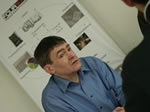
Peter Meller and his wife Olga are settling into their new home in Magdeburg, in Saxony in the east of Germany, where Peter has recently started a job as a software programmer for a small engineering firm.
Although he originally studied and worked as a mechanical engineer in Romania where he grew up, he had not worked in the sector for 15 years when, in 2008, he began a work experience placement at the company where he now works full-time.
His whole family moved back to their roots in Germany in 1990 – his parents, brother and sister as well as his first wife and young son. “We moved for financial reasons. It was really difficult to earn a living in Romania at that time.
“We had wanted to leave before but it was impossible.” The situation changed with the collapse of the communist regime. “At the time, all our family and friends were leaving,” says the 48 year-old.
Victim of downturn
Arriving in Bergisch Gladbach near Cologne in Germany at the age of 29, he initially got a job with a small company as a mechanical engineer. However, the German engineering sector went into decline at around this time and by 1993 he was left on the unemployment line.
With little prospect of securing another position as an engineer, he decided that retraining would help boost his employment prospects. He took a computer course. “Before that I had never really had much to do with computers,” says Peter.
After that he began developing computer-based training, working on a freelance basis. “It was completely different from my previous work,” he says. “I worked for a small company that developed courses for big companies to train their employees to use common software.”
He did this for several years and eventually set up a company doing the same type of work with four other partners. However, after a while the orders dried up and he was back to working on a contract basis. He continued working like this from 2001 until 2007, but was becoming increasingly dissatisfied with the irregular nature of the work. “I would work on a project for three months and then have nothing for months,” says Peter. “I could not see any future in it.”
Around this time engineering began to pick up again in Germany and Peter thought there could be opportunities for him to get back into his old profession. However, when he applied for mechanical engineering jobs, he found his lack of recent experience a problem.
Building on knowledge
A training programme, co-funded by the European Union through the European Social Fund, helped him to refresh and build on his engineering knowledge and skills. His course was one of 18 AQUA (Akademikerinnen und Akademiker Qualifizieren sich für den Arbeitsmarkt) organised nationwide, each aimed at a specific professional sector. Working with universities, the courses give already qualified people the chance to build on their knowledge and improve their job prospects.
Peter's course packed a full 10-semester degree programme in mechanical engineering into 10 months. “It was amazing how much I'd forgotten, but I was also relieved that more recent graduates had also forgotten,” he says. He also learnt more about recent developments, especially the use of computers in engineering, which was hardly covered in his original studies.
In addition to academic learning, the course covered practical skills for getting jobs, such as personal presentation, body language and communication, applying for work, and preparing for interviews. Peter noticed a big improvement in his personal skills. “I was able to go to an interview and answer the questions. I am now much more self-confident.”
A complex task
Peter was able to use his newly improved skills when he did a three-month placement at the firm where he now works. The company specialises in quality assurance processes for the car-making sector. “I realised what I had learnt was crucial. I was asked very early on to do complex computer programming. They gave me a non-urgent task which they didn't think I would be able to do. When they saw that I could do it they were impressed.”
At the end of his stint in October 2008, he was offered a permanent job. He now works as a software programmer for engineering machinery, a position that combines his engineering and computer skills.
“Before I had lots of knowledge and skills, but I didn't know how to tell people about it,” says Peter. “It's fair to say the course changed my life. I feel much more secure now and look forward to the future.”
